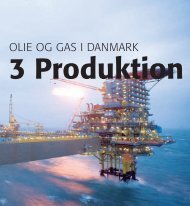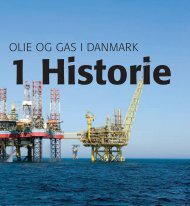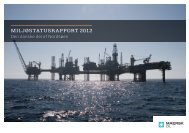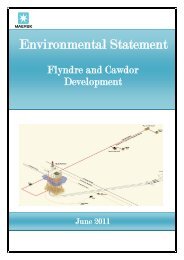Environmental Statement - Maersk Oil
Environmental Statement - Maersk Oil
Environmental Statement - Maersk Oil
You also want an ePaper? Increase the reach of your titles
YUMPU automatically turns print PDFs into web optimized ePapers that Google loves.
Balloch Field Development <strong>Environmental</strong> <strong>Statement</strong><br />
Appendix A – Review of Legislation<br />
Power Generation Offshore Combustion Installations<br />
(Prevention and Control of Pollution)<br />
Regulations 2001 (as amended 2007) (as<br />
amended by the Energy Act 2008<br />
(Consequential Modifications) (Offshore<br />
<strong>Environmental</strong> Protection) Order 2010)<br />
The Greenhouse Gas Emissions Trading<br />
Scheme Regulations 2005 (as amended<br />
2011)<br />
As discussed previously, under the Offshore Combustion Installations (Prevention and Control of Pollution) Regulations a<br />
permit is required if the aggregated thermal capacity of the combustion installation exceeds 50 MW(th). Such permits<br />
will have been issued prior to decommissioning operations and when aggregated thermal capacity falls below the 50<br />
MW(th) threshold during the course of decommissioning operations the installation will no longer be subject to the<br />
controls and the operators will be required to surrender the permit.<br />
Similarly, under these Regulations a permit is required to cover the emission of greenhouse gases if the aggregated<br />
thermal capacity of the combustion equipment on the installation exceeds 20 MW(th). Such permits will have been<br />
issued prior to decommissioning and must be surrendered when the aggregated thermal capacity falls below the<br />
threshold. The installation will then be deemed closed and will drop out of the EU TS. Installations will be able to retain<br />
and trade any surplus allowance for the year of closure, but will not receive any allowances for future years.<br />
Accidental Events<br />
Issue Legislation Regulator and Requirements<br />
<strong>Oil</strong> pollution<br />
emergency planning<br />
International Convention on <strong>Oil</strong><br />
Pollution, Preparedness, Response and<br />
Co‐operation (OPRC) 1990<br />
The Merchant Shipping Act 1995<br />
The Merchant Shipping (oil pollution<br />
preparedness, response and co‐<br />
operation) Regulations 1998<br />
BONN Agreement <strong>Oil</strong> Appearance Code<br />
(BAOAC)<br />
Offshore Pollution Liability Agreement<br />
4 th September 1974 (as amended)<br />
Petroleum (Production) (Seaward<br />
Areas) Regulations 1988 (as amended<br />
1996)<br />
<strong>Oil</strong> pollution Offshore Installations (Emergency Regulator: DECC<br />
The International Convention on <strong>Oil</strong> Pollution, Preparedness, Response and Co‐operation (OPRC), which has been ratified<br />
by the UK, requires the UK Government to ensure that operators have a formally approved <strong>Oil</strong> Pollution Emergency Plan<br />
(OPEP) in place for each offshore operation, or agreed grouping of facilities.<br />
The aims of this convention are enforced through national legislation such as the Merchant Shipping Act 1995 and the<br />
Merchant Shipping (oil pollution preparedness, response and co‐operation) Regulations 1998.<br />
This code was adopted following the BONN Agreement for co‐operation in dealing with pollution of the North Sea. The<br />
code gives a standard format to quantify the amount of oil that is polluting a body of water.<br />
All offshore operators currently active in exploration and production on the UKCS are party to a voluntary oil pollution<br />
compensation scheme which is known as the Offshore Pollution Liability Association (OPOL).<br />
These regulations relate to applications for offshore petroleum exploration and production licences and the clauses to be<br />
incorporated in such licences. It gives effect to certain model clauses such as Model Clause 23(9) which requires offshore<br />
facilities to have a liability regime where there is a risk of discharging oil causing pollution damage.<br />
A ‐ 31








